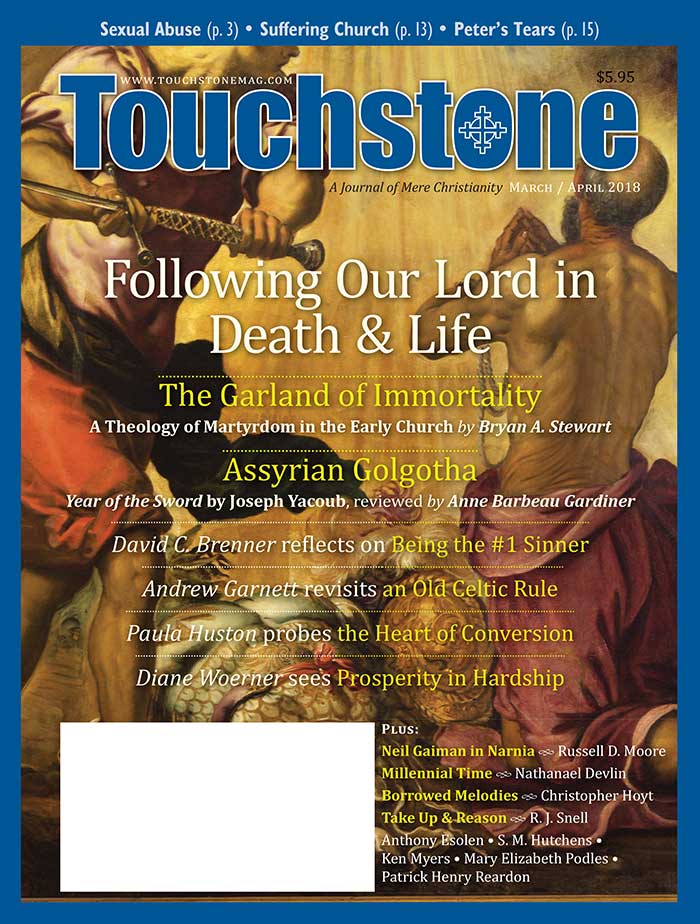Feature
Watchful Dragons
Neil Gaiman’s Brush with Narnia Lingers
by Russell D. Moore
Last year, Neil Gaiman published his long-awaited work, Norse Mythology, a collection of the ancient stories of the Nordic gods. This is not a translation, but a retelling. As Eugene Peterson’s The Message is to the Bible, Gaiman’s Norse Mythology is to Norse mythology. The book was widely anticipated not so much because it collects mythic tales as because of the author himself. For many of his readers, Gaiman awakened an interest in the old gods in the first place. And for Gaiman himself, something of this longing for Valhalla started in the wardrobe of a spare room.
At first glance, Gaiman would seem to be of little interest to those Christians who are unfamiliar with his work. Why should they pay attention to him any more than they would to the latest young adult werewolf romance? Gaiman is important, though, because he is not just a bubble on the surface of popular culture but a tidal current within it. We also should give him some attention because he is raising the sorts of questions we will want raised if we are to bear witness to Christian orthodoxy in a “post-Christian” Western culture.
At the risk of being hyperbolic, one could say that to understand Neil Gaiman is to understand pop culture, and by pop culture I mean virtually all of it. For decades, readers have known him for his best-selling fantasy and science fiction novels, such as American Gods and The Ocean at the End of the Lane. Children (and their parents) know him as the author of the book upon which the (very creepy) animated film Coraline was based, and for his children’s books, such as The Graveyard Book and Crazy Hair. Comic book fans know him as the author of a wide range of comics, from issues of Batman to his award-winning series of graphic novels, The Sandman. One might also know him for his short story collections or his non-fiction essays on everything from the craft of writing to music reviews of Tori Amos and Lou Reed.
His 2012 commencement speech “Make Good Art” went viral—first as a YouTube video and then as a graduation gift-book (seriously, how many graduation speeches does one want to hear the first time, much less over and over again? This one). With the release last year of his new volume retelling the classic tales of Norse mythology, and the serialization of his American Gods on a cable television network, Gaiman has planted his flag in that medium as well.
In fact, it would be hard to find a story-telling medium, with the possible exceptions of opera and hip-hop, where Gaiman isn’t somewhere at work—and who knows whether the new Gaiman aria or rap track will be issued by the time this article goes to print.
A Complicated Relationship
The connection between C. S. Lewis and Neil Gaiman isn’t as obvious as Gaiman’s imaginative debt to, say, Ray Bradbury. After all, Lewis is best remembered as a committed Christian apologist, while Gaiman is decidedly, well, not. But Gaiman is not anti-Lewis, like, say, Phillip Pullman, whose Golden Compass books set out to dethrone Aslan with a bleak, atheistic universe. Gaiman’s relationship to Lewis is more complicated.
Lewis and Gaiman have more in common than their United Kingdom accents and their United States fan bases. As children, though from two different generations of the twentieth century, both had their imaginations lit up initially by popular culture artifacts—in Lewis’s case, Beatrix Potter’s Squirrel Nutkin; in Gaiman’s, Stan Lee’s The Mighty Thor. Both were drawn to Norse mythology and its sense of “Northernness,” including the death of Balder. And both were repelled by the church but drawn to Narnia.
Narnia, after all, was initially created to rescue a sense of the sacred from the established church and from what Inklings biographers Philip and Carol Zaleski describe as “the moralistic sentimentality by which it has been deadened” (The Fellowship: The Literary Lives of the Inklings, 2015, p. 390). This was why, Lewis concluded, he didn’t feel the weight of the stories of Scripture. They were too familiar to him.
“But suppose that by casting all these things into an imaginary world, stripping them of their stained glass and Sunday school associations, one could make them for the first time appear in their real potency?” Lewis wondered, in retrospect. “Could one not thus steal past those watchful dragons? I thought one could” (ibid.).
Russell D. Moore is president of the Ethics and Religious Liberty Commission of the Southern Baptist Convention. He is a senior editor of Touchstone.
subscription options
Order
Print/Online Subscription

Get six issues (one year) of Touchstone PLUS full online access including pdf downloads for only $39.95. That's only $3.34 per month!
Order
Online Only
Subscription

Get a one-year full-access subscription to the Touchstone online archives for only $19.95. That's only $1.66 per month!
bulk subscriptions
Order Touchstone subscriptions in bulk and save $10 per sub! Each subscription includes 6 issues of Touchstone plus full online access to touchstonemag.com—including archives, videos, and pdf downloads of recent issues for only $29.95 each! Great for churches or study groups.
Transactions will be processed on a secure server.
more on C. S. Lewis from the online archives
more from the online archives

28.2—March/April 2015
Man, Woman & the Mystery of Christ
An Evangelical Protestant Perspective by Russell D. Moore
calling all readers
Please Donate
"There are magazines worth reading but few worth saving . . . Touchstone is just such a magazine."
—Alice von Hildebrand
"Here we do not concede one square millimeter of territory to falsehood, folly, contemporary sentimentality, or fashion. We speak the truth, and let God be our judge. . . . Touchstone is the one committedly Christian conservative journal."
—Anthony Esolen, Touchstone senior editor











